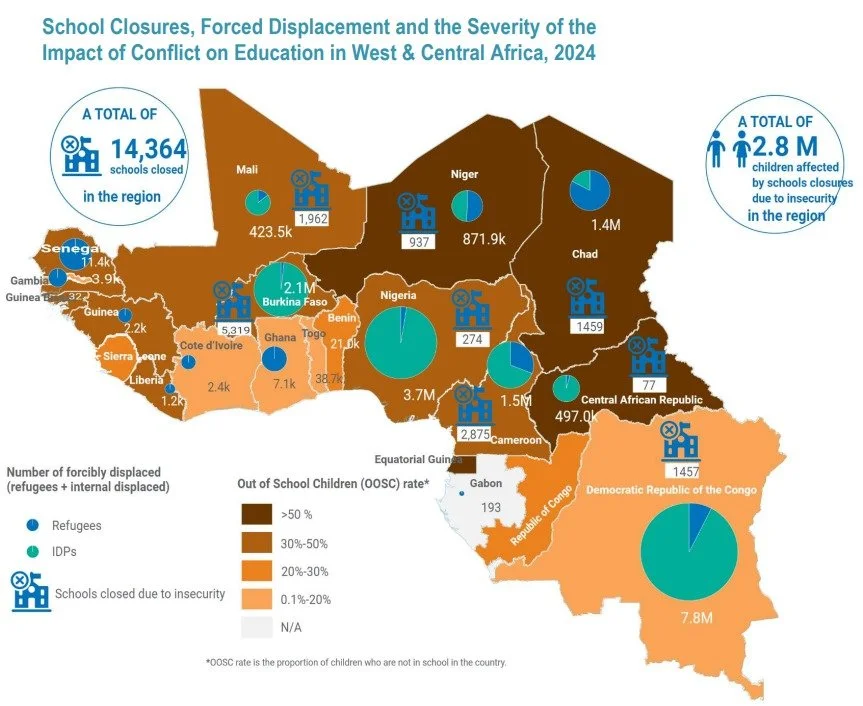Over 2.8 Million Children Out of School Due to Conflict in West and Central Africa in 2024
Education Under Attack in West and Central Africa Report
By Edward Francis Dalliah
Education, considered the bedrock for a brighter future and a fundamental human right, continues to suffer setbacks due to conflicts across Africa. According to the United Nations International Children’s Emergency Fund (UNICEF), “in West and Central Africa alone, more than 14,000 schools are closed mainly due to conflict, affecting 2.8 million children” in June 2024.
Speaking at the opening session of the 81st ordinary session of the African Commission on Human and Peoples Rights (ACHPR) on behalf of the High Commissioner Mr Volker Türk, representative Mr Christian Mukosa delivered a statement highlighting that “education is not just a tool for individual development, it's also a crucial driver of broader economic transformation for countries”.
Unfortunately, “the journey to providing quality education for all is filled with many challenges [such as] persistent inequalities, poverty, ongoing conflicts. And the displacement of vulnerable people continues to deprive millions of their right to education” said Mr Mukosa.
Based on the situation analysis conducted by the Regional Education in Emergencies Working Group (R-EiE WG), “this year, the number of school closures due to insecurity in West and Central Africa has continued to rise, increasing from 13,263 in June 2023 to 14,364 in June 2024”, with Burkina Faso registering the highest among the eight countries highlighted. In total, 2.5 million children were impacted in 2023 which rose to 2.8 million children impacted in 2024.
The report revealed that countries like Burkina Faso, Mali, Cameroon, and the Democratic Republic of Congo (DRC) who have experienced coups have suffered the most and that the closure of schools deprives children of education, jeopardizing their futures and also exposes them to grave risks such as recruitment by armed groups, child labour, physical violence, and sexual exploitation.
Although these challenges still persist, in Mali and the Central African Republic, “the number of attacks on educational institutions [has] decreased between 2022 and 2023, thanks to reduced violence in certain regions. In Burkina Faso, approximately 1,300 schools have reopened this year in areas under government control, enabling thousands of children to return to school”, the report revealed.
No of Schools Closed Due to Insecurity in June 2024 © Report
Back in 2015, the governments of Norway and Argentina led a process among United Nations (UN) Member States to develop the Safe Schools Declaration, an inter-governmental political agreement dedicated to protecting education in armed conflict. Since then, 120 states around the world have joined this international political agreement. However, despite its existence continents like Africa continue to face closure of schools due to conflict.
In a press conference held after the opening ceremony of the 81st ordinary session of the ACHPR, a reporter questioned the Chairperson of the Commission, Hon Rémy Ngoy Lumbu to explain what the ACHPR is doing to address the closure of schools in Burkina Faso and other African countries.
In his response, Hon Lumbu explained that countries are facing many challenges because of terrorism and neocolonialism. He revealed that during their forum a day before the opening session, they were discussing about those countries and “said instead of fighting them, we should establish a dialogue to accompany so that they can finish the period of transition and come back fully in the [African Union]”.
In addition he noted that countries should do their best so that children affected can go back to school “because education is the future of the countries [and] if they are not taking care of education, they are sacrificing themselves”.


